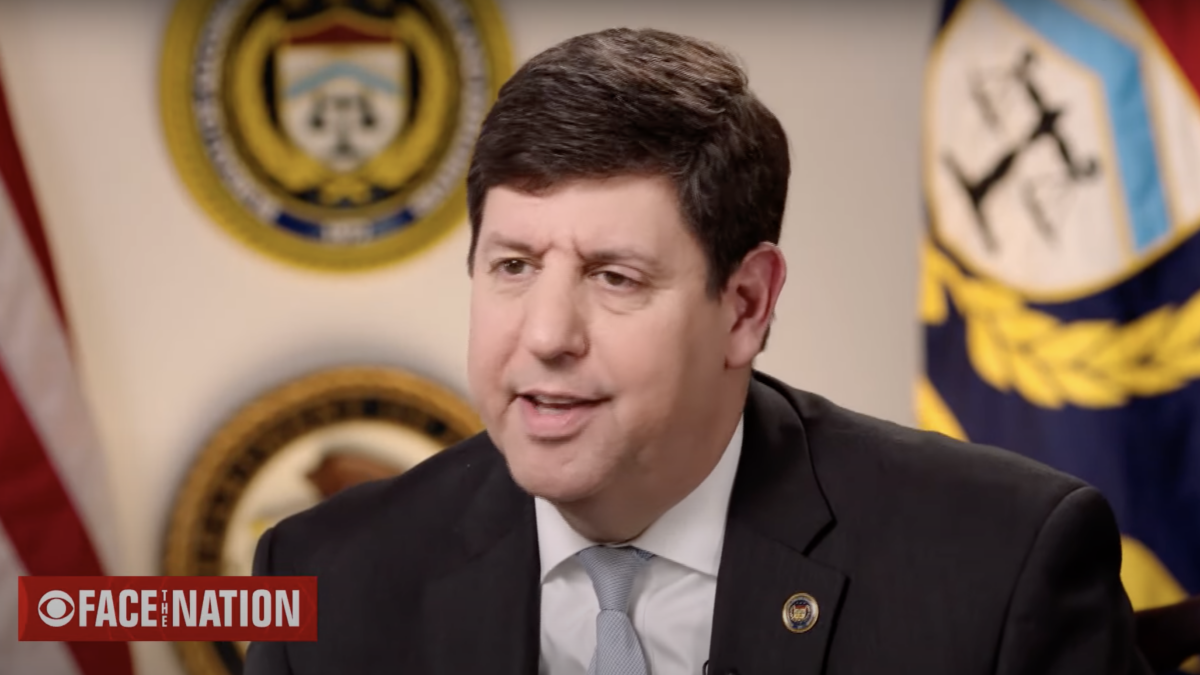
Recently the Biden administration announced its plan to publish several executive orders seeking to expand federal gun control. While much has been discussed about the so-called “ghost gun” and pistol brace orders, it’s Biden’s proposed “red flag law” guidance that has reignited a conversation about states’ powers and what they can do to resist the federal government.
Extreme Risk Protection Order laws, commonly called red flag laws, authorize law enforcement officers to seize an individual’s firearms based on a judge’s determination the individual poses a danger to himself or others. The problem, however, is the individual losing access to his lawfully owned firearms isn’t allowed to defend himself before his firearms are seized.
The initial hearing is what lawyers call ex parte — meaning only one side is in front of the court. As the individual is not present to defend himself, under the U.S. Constitution, these sorts of ex parte proceedings pose grave due process problems.
Red flag laws aren’t just problematic in principle, they’re also ripe for abuse. Along with the basic threat posed to our rights to keep and bear arms and to due process, red flag laws can be wielded against political opponents, individuals of specific racial groups, or even simply those with unpopular opinions. Vice President Kamala Harris is on record supporting a federal red flag law that could be used to target political opponents by branding them “domestic terrorists and hate crime perpetrators.”
Red flag laws create a system where Americans are presumed to be dangerous by judges whose mindset is “better safe than sorry.” Nineteen states and Washington D.C. have already adopted these laws. But now, President Biden has indicated that he is going to pressure every state to adopt them. The question is whether the federal government has that power.
What the States Can’t Do
Many cities and states have tangled with the idea of “nullification,” whose proponents argue state governments can “nullify” federal law if the state believes a federal law is unconstitutional. The controversy goes back to the earliest years of our republic, when in the final years of the 18th century, Thomas Jefferson and James Madison drafted resolutions for Kentucky and Virginia arguing that states could determine the constitutionality of federal laws and prevent enforcement of laws within their borders if deemed unconstitutional.
Even then — and with such powerful and influential supporters — nullification lacked popular support, and most states disagreed with the Kentucky and Virginia resolutions. The idea has been mostly dormant since the Civil War, but the concept has deep roots and never entirely died out.
Recently, things have started to simmer again. On Feb. 3, 2021, Newton County, Missouri passed what essentially amounts to a preemptive attempt at nullification in its “Second Amendment Preservation Act,” which states:
All federal acts, laws, orders, rules, and regulations passed by the Federal government … which infringe on the people’s right to keep and bear arms as guaranteed by the Second Amendment to the United States … shall be considered null and void and of no effect in this county.
Furthermore, the act stipulates that “any and all federal agents trying to enforce” the regulations in question “shall be subject to arrest by the Sheriff’s department.” According to the act, Newton County will not merely decline to cooperate with the enforcement of federal laws it regards as unconstitutional but may actively prevent such laws from being enforced in the county.
Non-cooperation by state officials with federal law enforcement is not nullification, although it is sometimes mistakenly called by that name. Nullification means affirmatively attempting to prevent the federal government from enforcing federal law within the state’s borders — much stronger than non-cooperation.
Nullification is sometimes an attractive concept for liberty-minded people, and its proponents raise some valid questions. As a matter of practical realism, however, we must recognize that nullification has not succeeded as a political strategy or in the courts.
Notably, nullification was rejected by the Supreme Court in Cooper v. Aaron, when certain states objected to the court’s holding in Brown v. Board of Education. There is little reason to suspect the court would be open to revisiting the issue today. Another legal doctrine, however — the anti-commandeering doctrine —not only remains on the table but sits front and center.
What the Feds Can’t Do
It may seem counterintuitive to some, but the issue is well-settled: the federal government cannot force state officials to prosecute and enforce federal law.
Our constitutional system is one of dual sovereignty, in which state officials are not federal officials and vice versa. Accordingly, state officials cannot be compelled — or “commandeered” — to complete federal tasks. To be sure, states may voluntarily cooperate with federal law enforcement, often in exchange for significant federal subsidies, but they cannot be forced to do the job.
In recent years, this distinction has often been made around federal immigration law. But the case that clarified it was related to gun rights, Printz v. United States. In Printz, the Supreme Court ruled that a federal law requiring “local chief law enforcement officers” to perform background checks on handgun purchasers was an unconstitutional violation of our dual sovereignty model.
When understood in this way, the emerging concept of “Second-Amendment sanctuary cities” (or states) is constitutionally sound. Jurisdictions can absolutely stand against the federal government, not by nullifying its laws but by simply declining to assist in their enforcement.
Unfortunately, state or local resistance is unlikely to be so simple. This brings us to the route the Biden administration is looking to take — motivating states to pass what would technically be “their own” red flag laws by making federal funds conditional on such actions.
Biden’s Carrot and Stick
Like it or not, under a very dubious interpretation of the “general welfare” clause, Congress is understood today to possess immensely vast powers to tax individuals and spend the resulting revenue as it sees fit. This, in turn, has given the federal government tremendous leverage over the states through an approach of “carrots and sticks” — granting or denying federal funds, as an incentive for states to do what Congress wants.
A de facto national drinking age of 21, for example, was established by threatening cuts in federal highway funding to states that did not set this as the minimum legal age. This was upheld by a 7-2 majority in the Supreme Court case of South Dakota v. Dole.
It’s clear we have strayed quite far from the federal government’s authentic enumerated powers in taxing and spending. Nonetheless, there is no realistic, imminent possibility of overturning South Dakota v. Dole or the interpretation of the federal taxing and spending powers that underly it.
There is, however, a simple solution to resisting a federal red flag law “suggestion”: States can say “no.” Nothing requires a state to take the federal funding.
But states would have to value the rights of their citizens over the dollars the Biden administration will wave in front of them. So, while the situation isn’t hopeless, with potentially many millions of dollars in incentives at stake, it’s certainly an uphill battle.









